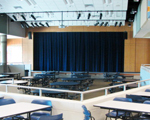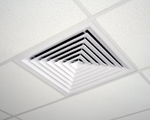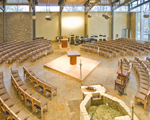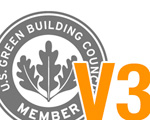Sounding Off: Our Blog
Thoughts, insights, and perspectives on the latest news, trends, and issues regarding architectural acoustics, environmental and industrial noise and vibration, and audiovisual systems design.

If It Sounds Like Noise to You, It May Be “Esion”
Fundamentally, sound is “that which we hear”. What we hear at any given time can greatly influence us. We use sound to communicate, to express warning, fear, pleasure and excitement. Some sounds can relax us and help us fall asleep, while other sounds can distract us and make it more difficult to perform simple tasks. Different sounds can be soothing and pleasing or annoying and irritating. Accordingly, determining “What is sound?” and “What is noise?” can become a highly subjective task. As engineers and scientists, it’s our job to generate generalized models that have a high level of correlation to humans (or to specific populations).

Space Savers | Acoustical Engineering for Gymnatoriums and Cafetoriums
It certainly isn’t a new idea… How do we maximize our space and minimize our cost without the loss of function? Surely this is the major driver behind ideas like the gymnatorium or the cafetorium. We’ve all seen them, most likely they were in the schools that we attended. They consist of a stage at one end of the room or tucked away in the corner. So, do these budget savers really work like they are supposed to?

When One Size Does Not Fit All | Diffuser Sound Levels
On a recent trip to India, I discovered a cute clothing sizing term called “free size” which is equivalent to “one size fits all”. Free size clothing must be a manufacturer’s delight since production and distribution are greatly simplified. Adjustments to the size of the garment are typically made through waist ties of various designs and if needed, permanent alterations.

The Varying Acoustical Needs of Churches
Some acoustical environments are straightforward in purpose. A movie theatre, for example, needs to project the sound of the movie with precision and clarity to all seats in the house. Most acoustical environments, however, have varying needs which are dependent on their content and delivery, and the Church is no exception. Today’s churches use a wide variety of forms of aural communication – drama, dance, video, soloists, choirs, the spoken word, and so on. But by far, the two most prominent aural elements in church services are music and the spoken word; two elements that require vastly different (and somewhat conflicting) acoustical environments. Today we will explore the optimal environments for both.

My Scarlet Letter | Distractions in the Classroom
At Acoustics By Design we talk a lot about standards. Sometimes, the standards are hidden behind terms like design goals, baseline design, or even ordinances and specifications… But they are all standards. The reality is almost all aspects of our lives are governed by standards; regardless of how well they work or how well we adhere to them, we still use them in decision making.

White Space Update for Wireless Microphones
Several months ago (10-13-08) I wrote about the current state of the wireless microphone frequency spectrum and how the actions of congress and the FCC are shaping the future of wireless technology. Well, several notable updates and changes have been made since that time. You may recall that February 17, 2009, was the date set for the transition to DTV (Digital TV). Congress (in all its wisdom) decided that it would extend the deadline to June 12, 2009.

The Leaky Bucket | How Sound Escapes
Blocking sound is often analogized to plugging the holes in a leaky bucket. If you plug up all the bucket holes except one, the bucket is still going to drain. In acoustics, an outstanding partition design will not adequately block sound if holes and weak spots exist where sound can find its way through.

College Campuses and Student Union Acoustics
At Acoustics By Design, we regularly consult on the design of College and University buildings including classroom buildings, dormitories, athletic facilities, performing arts buildings, libraries, research buildings, and student centers. These numerous building types result in our needing to address a myriad of acoustic and vibration issues. Many student centers and student unions face a similar problem: loud noise from the commercial kitchens inhibit the relaxed social environment for the students. Universities want their student unions to be a center for campus life and activity, and if the student center is too loud to provide the desired environment, students will inevitably congregate elsewhere.

How LEED V3 Changes Everything
It’s official! The all new LEED Version 3 has been launched by the U.S. Green Building Council. The new system makes several big changes that affect everyone from architects and engineers to builders and building owners. This information is especially important if you are working on a LEED project or if you are a LEED Accredited Professional. Here are some of the initial updates at a glance:

How Green Design Can Save You Some Green $$$
It seems like every project that comes across my desk has a stated goal of attaining some level of LEED Certification (LEED Silver, Gold, Platinum, whatever). We’re talking K-12 schools, universities, healthcare facilities, churches – they’re all “going green.” But how much does all this stuff cost? And can green design really save you some green $$$?